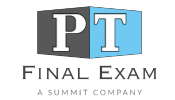Hey all,
I sincerely hope your studying is progressing steadily. There is so much to cover, and now we’re down to the final 4 weeks before the biggest exam of your life. The good news is that you have been prepared for this for 3 years now. The bad news is that it tests everything you know in just a few hours.
As many of you already know, the NPTE was updated for 2013. From this update, there were 2 major changes that should affect how you study.
- The content outline is reflective of current trends in physical therapy education. Several categories were eliminated (such as Metabolic and Gastrointestinal Examination, Teaching and Learning) or reduced (such as Nonsystems domains and Research). This places a greater emphasis on Examination, Evaluation, and Intervention in the categories of Cardiovascular, Musculoskeletal, and Neuromuscular systems.
- The scoring model now follows an “Item Response Theory” which will accomplish several goals. First, it will more accurately discern between “guessers” and candidates who really know their stuff. Secondly, it will allow a more detailed feedback report for those who failed the exam.
For me, the content changes make a lot of sense. As our profession develops toward a more professional and “specialist“ role, we must be sharp on the things that we do best and refer out for the things that are not our strong points (such as gastrointestinal disorders).
The changes in the scoring will also cause some good changes. For students who fail the NPTE, there will be a more detailed report available, giving a very clear breakdown of which areas were weak and which areas were strong. This will also allow for utilization of the full scale from 0-800. In the past, there were virtually no candidates who “aced” the exam. Now, anything about 90% or above will be reported as an 800/800. In the FSBPT algorithm, most candidates will be near the 600/800 passing score, which will be more sensitive to subtle differences between candidates.
What this means for you:
- You should still study everything (not new)
- Be very aware of your strengths and weaknesses—it will be more important now to score well in all of the categories.
- Find lots of ways to practice analyzing and applying all of your studied material. Many of the questions on the NPTE are not just simple recall items—they are very often analytical and ask for application of principles.
As always, if you have any questions, do not hesitate to contact me! Buon proseguimento!

